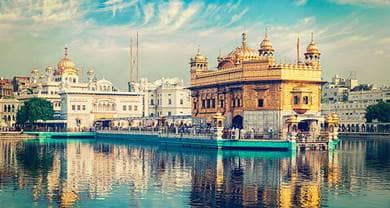- Trending:
- Pope Francis
- |
- Resurrection
- |
- Trump
- |
- Social Justice
- |
- Peace
- |
- Love

RELIGION LIBRARY
Sikhism
Afterlife and Salvation
Written by: Rahuldeep Singh Gill
The Sikh tradition emphasizes a life free of worry about the afterlife, but focused on one's ethical actions and piety in this life. "Liberation" (mukti) is the metaphor for the best result possible in the afterlife, and Sikhs envision that as finding unification with the creator at his court. Doing well in the cycle of birth and death ("coming and going," or reincarnation) have brought about the specific human life that must now use the opportunity to reach the divine court. That is to say, the Sikh belief system combines the idea of "reincarnation" (which brings a human life) with the idea of an afterlife in a paradise-like court of God. Therefore, because life provides such an opportunity, death need not be feared. Guru Nanak wrote:
People of the world, don't berate death! Few know how to die
Serve your Sovereign, and the path ahead will be easy to tread
Tread the easy path, earn its fruits, and seek praise hereafter
Offer the fruits you earn here, merge with Truth, and receive your earned honor
In the Master's mansion, you will enjoy His love
We wouldn't berate death, if we knew how to die! (GG 579)
In Guru Nanak's conception, worldly actions, no matter the religious allegiances, are accounted for by a divine process beyond human understanding. Those who have lived good lives, whether Sikhs or non-Sikhs, have nothing to fear hereafter.
An exact picture or location of the divine court is a moot point in Sikh thought, for ethical and pious living is an end in itself. Writers from the Gurus' times compared the Guru's worldly court with the Court of Kartar, and those who selflessly sought the Guru's protection received its shelter in this world and the hereafter. Liberation is not to be achieved by renouncing the world, but by seeking Kartar while living a productive, societal life. Thus, family life is a necessary feature in working out one's liberation, as is a commitment to ethical and social living. Divine grace will liberate the soul; ethical living and performing meritorious actions can help prepare the individual to receive that grace, which is ultimate and bestowed only by the creator.
According to Bhai Gurdas, the Sikh savant of the early 1600s, certain actions are particularly meritorious (saphal, literally "fruitful") on the spiritual path. Whereas systems of patronage in other religious traditions equated merit with donations for religious establishments, Bhai Gurdas reports that simply teaching another Sikh how to read the scriptures is as meritorious as funding a hundred golden temples. Pilgrimages to far-away shrines are not necessary, as the holy congregation provides regular opportunities to gain merit. Sikhs there can listen to the holy word and apply it to their daily lives. They can also perform sustaining acts for the congregations: tending to the hearth, bringing water for worshipers, fanning the congregation, cooking, cleaning, and advancing Sikh educational aims.
Service is important to Sikh life because it helps curtail the fundamental obstacle to liberation: the ego (haumai), which binds the individual to a false sense of self and belonging in the world. What is most real is not the world, but the creator who brought it into being. Those who worship the Maker, having seen beyond the made, are the truly pious and attain liberation. Guru Angad (1504-1552) provides the definition of the manmukh, or self-centered person:
Know the manmukh as he who prefers the gift to the Giver
What can we say of such an intellect and its clever ways?
Our actions are known to the four directions, though we commit them at home
Righteous actors are known as righteous, and sinners are known as sinners
Creator! You play this whole game, who else can I mention?
So long as your light shines inside, you speak, without it there is nothing
Nanak says: wisdom comes to the pious one from His grace alone. (GG 138)
In this citation, the "pious one" is literally the gurmukh ("Guru-facing"), or the one who has put the Gurus' teachings at the center of life.
How one dies can also bring one closer to the divine court. Sikh tradition holds that dying with the divine on one's mind is salvific, as is dying for a just cause. Bhai Gurdas wrote that suffering at the hands of manmukhs would lead to redemption, liberation, and a place in the divine court. Guru Nanak taught that the brave one who died for a good cause would be hailed as a warrior in the hereafter (GG 579-80).
Study Questions:
1. Why should Sikhs not worry too much about the afterlife?
2. How do they seek liberation?
3. What role does service play on the path to liberation?










